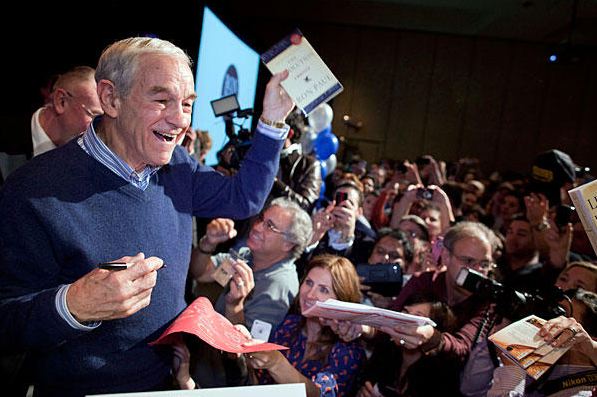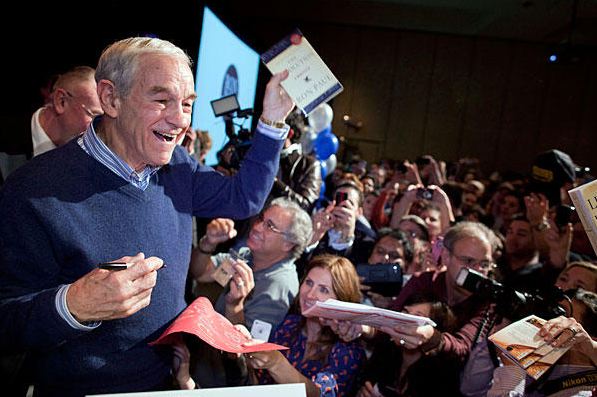Ron Paul’s legacy is just getting started: The next generation of the liberty movement
{$excerpt:n}


(AP Photo)
It’s no secret that in 2008 and 2012, Ron Paul’s presidential campaigns enjoyed a disproportionate level of support from younger Americans in their teens and twenties. In fact, in 2012, Ron Paul carried nearly half of all the under-30 voters in both Iowa and New Hampshire.
Many of us – growing up in a state of seemingly perpetual war, mounting national debt, and a failing economy – wanted to see something different in politics. Ron Paul offered that “something different.” Now almost ten years later, what has come of the liberty movement, and what will come of it throughout the next ten or twenty years?
It’s important to first assess where the movement currently stands. First and foremost, Ron Paul brought the ideas of liberty into public discourse. He energized the liberty movement in the United States, and now according to a YouGov poll, 20 percent of millennials consider themselves libertarians.
Despite this, the Libertarian party has been ineffective in electing candidates. Instead, the real effect of Ron Paul’s candidacy can be seen in the Republican party. While Dr. Paul has retired from Congress, even more libertarian leaders have stepped up to take his place. Between Sen. Rand Paul (R-KY), Rep. Justin Amash (R-MI), and Rep. Thomas Massie (R-KY), libertarian representation in Congress has grown significantly. Libertarian and Tea party allies have serious sway in the House with the Freedom Caucus.
However, the more developments we see in 2018, the more it looks like this could be a big year for libertarian candidates. During the midterms, libertarian and libertarian-leaning candidates will be running for Senate in four states: Austin Petersen in Missouri, Eric Brakey in Maine, Danny Tarkanian in Nevada, and Matt Rosendale in Montana. In the House, Shane Hazel is running for Georgia’s 7th Congressional District and Andy Sanborn is running for New Hampshire’s 1st Congressional District.
What’s significant about this election is not the number of candidates running, but rather their ages. Of these candidates, the oldest is Matt Rosendale, at only 57 years old. The youngest is Eric Brakey, at 29 years old. Brakey and Petersen are both former volunteers for Ron Paul and both indicative of what’s to come in the Republican party: Libertarians across the country, motivated by Ron Paul, are becoming eligible to run for office and are getting ready to do so.
With the help of organizations like Students for Liberty, the Leadership Institute, and Young Americans for Liberty, young adults have been given the resources and training necessary to work on campaigns and run for office. In due time, these young libertarians will start to occupy seats across the country in local, state, and federal governments. This is how a movement is built and sustained. The liberty movement can’t and won’t survive on Ron Paul alone. It will instead be propelled by the young candidates motivated by Ron Paul.
I know this from firsthand experience. I am an 18-year-old college freshman, who became a follower of the liberty movement as a direct result of the 2012 presidential election. Now, I’m the president of my school’s chapter of Young Americans for Liberty (YAL). At the YAL National Convention this summer, I spoke to dozens of the 400-plus activists attending. Their backgrounds varied widely, coming from across the country, motivated by anyone from Ron Paul to Austin Petersen, but one thing held true for almost everyone I spoke to: they were considering running for office someday.
This isn’t just big talk. Young liberty activists are running for office right now. In fact, my roommate at the convention, Wilson Wells, is currently running for a county representative position in New York. Christian Ehmling, a YAL Texas State Chair, is running for a Texas seat. Rebekah Bydlak, a former YAL Florida State Chair, ran for the United States House in 2016 with the endorsement of Ron Paul, and is currently running for a seat in Florida’s House. Catherine Bernard ran for a seat in Georgia’s House in 2016.
The current Congress is one of the oldest legislative bodies in our nation’s history. As these members of Congress retire, and as some are primaried, young libertarians will replace them. With Ron Paul in retirement, his movement may seem limited now; but as his young followers grow up and gain valuable experience in politics, they will slowly become the future of politics – and that’s starting to happen now.
The post Ron Paul’s legacy is just getting started: The next generation of the liberty movement appeared first on Red Alert Politics.
Source: Red Alert Politics


